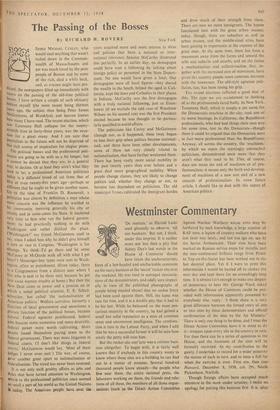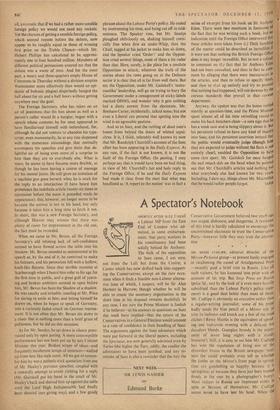Westminster Commentary
`DE mortuk2 as Harold Laski used gloomily to observe, 'nil nisi bunkum.' But not, I think, under this imprint. It is neither more nor less than a pity that Sidney Dye's last words in the House of Commons should have taken the uncharacteristic form of a hot-headed and uncharitable comment on the nasty business at the 'secret' rocket-site over the weekend. He was loud in outraged denuncia- tions of the demonstrators, and oddly sure (especi- ally in view of the published photographs of people being mauled about) that no undue force had been used against them. Still, the lapse was rare for him, and it is a double pity that it had to be his last. While he balanced on the most pre- carious majority in the country, he had gained a small but solid reputation as a man of common sense and uncommon intelligence. The combina- tion is rare in the Labour Party, and when I add that he was a successful farmer it will be seen how sorely the party will miss him.
But the rocket-site entr'acte was a curious busi- ness altogether. To begin with, it is fairly well known that if anybody in this country wants to know where these sites are a-building he can find out in a matter of minutes. Several hundred thousand people know already—the people who live near them, the entire national press, the labourers working on them, the friends and rela- tions of all these, the members of all those organ- isations (such as the Direct Action Committee Against Nuclear Warfare) whose aims may be furthered by such knowledge, a large number of RAF men, a legion of country walkers who have lost their way lately, and last but (go on, say it) the Soviet Ambassador. Their sites have been marked on Russian service maps for months, and the inter-continental ballistic range from Plotsk to Top-on-the-Secret has been worked out to the last decimal place. Yet if I were to print this information I would be hauled off to chokey the next day and kept there for an exceedingly long time. It is almost (sic) enough to make one despair of democracy to hear Mr. George Ward, asked whether the House of Commons could be pro- vided with information apparently possessed by everybody else, reply : 'I think there is a very great difference between the forced entry of one or two sites by these demonstrators and official confirmation of the sites by the Air Ministry.' There is only one thing to be done, and I trust the Direct Action Committee have-it in mind to da it :. trespass upon every site in the country in turn. For then there can be a series of questions in the House, and the locations of the sites will be formally recorded. As my contribution to the gaiety, I undertake to record for a wider posterity the names of each in turn, and to issue a full list when the exercise is over. First site, then (see Hansard, December 8, 1958, col. 29), North Pickenham, Norfolk.
Though foreign affairs have occupied much attention in the week under scrutiny, I make no apology for putting this business first. It is, after all, axiomatic that if we had a rather more sensible foreign policy we would not need any rockets. Yet the chances of getting a sensible foreign policy, which seemed remote before the debate, now appear to be roughly equal to those of winning first prize on the Treble Chance—which Mr. Hubert Phillips has calculated to be. approxi- mately one in four hundred million. Members of different political persuasions assured me that the debate was a waste of time. And for the most part, a weary and three-quarters empty House of Commons (a Thursday without a division empties Westminster more effectively than would an epi- demic of bubonic plague) dispiritedly banked the ball about for six and a half hours without getting anywhere near the goal.
The Foreign Secretary, who has taken on an air of jauntiness that tits him about as well as a parson's collar would fit a burglar, began with a speech whose contents he for once appeared to have familiarised himself with beforehand, for, although he did not venture to abandon his type- script, even momentarily, he at any rate dispensed with the numerous misreadings that normally accompany his speeches and give them that de- lightful air of being even more of a surprise to him than they are to everybody else. What is more, he seems to have become more flexible, as though he has been having a course of massage for his mental joints. He still gives an imitation of a machine gun gone berserk when he is stuck for the reply to an interjection (I have heard him pronounce the indefinite article twenty-six times in succession before the noun it preceded made its appearance); this, however, no longer seems to be because the answer is not in his head, but only because it takes him a long time to fetch it out. In short, this was a new Foreign Secretary, and although Heaven may witness that there was plenty of room for improvement in the old one, the fact must be recorded.
When we came to Mr. Bevan, all the Foreign Secretary's old whining lack of self-confidence seemed to have flowed across the table into his Shadow. Mr. Bevan sounded as uninterested in his speech as, by the end of it, he contrived to make his listeners, and his peroration fell with a hollow, knell-like flatness. Since that terrible moment at Scarborough when I heard him refer to his age for the first time in public, and a great gulf of yearn- ing and broken ambition seemed to open before him, Mr. Bevan has been the Shadow of a shadow. He was touchy and irritable, snarling at Mr. Price for daring to smile at him, and letting himself be drawn on, when he began to speak of Germany, into a curiously faded attack on German rearma- ment. It is not often that Mr. Bevan sits down to a cheer that is nothing more than a brief grunt of politeness, but he did on this occasion.
As for Mr. Sandys, he sat down in silence punc- tuated only by open jeering. A more contemptible performance has not been put up by any Cabinet Minister this year. Broken scraps of ideas—and frequently incoherent scraps of sentences—wafted up from him like stale scent. All we got to remem- ber him by was a pathetic trick quotation from one of Mr. Healey's previous speeches, coupled with a cowardly attempt to avoid yielding for a reply (Mr. Gaitskell put his hand in the small of Mr. Healey's back and shoved him up against the table until the Lord High Indispensable had finally been shouted into giving way), and a few gaudy phrases about the Labour Party's policy. He ended by overrunning his time, and being cut off in mid- sentence. The Speaker rose, but Mr. Sandys ploughed obliviously on, shaking• himself comi- cally free when first an under-Whip, then the Chief; tugged at his jacket to make him sit down, and the Speaker cried 'Order!' and the Opposi- tion cried several things, most of them a lot ruder than that. Here, surely, is the place for a resolute Opposition to attack; whatever the truth of the stories about the rows going on in the Defence sector it is clear that all is far from well there. But no; the Opposition, under Mr. Gaitskell's 'states- manlike' leadership, will go on trying to bury the Government under a consignment of sticky-labels marked OHMS, and wonder why it gets nothing but a dusty answer from the electorate. Mr. Bonham-Carter, incidentally, talked sense; but not even a Liberal can pretend that spitting into the wind is an agreeable pastime.
And so to Suez, and the rattling of dead men's bones from behind the doors of whited sepul- chres. It is, I think, tolerably Well known by now that Mr. Randolph Churchill's account of the Suez affair has been appearing in the Daily Express. At any rate, if the fact is not known, it is not the fault of the Foreign Office. (In passing, I may perhaps say that it would have been no bad thing, in view of Mr. Churchill's hot and holy reply to the Foreign Office, if he and the Daily Express had made it clear from the start that what was headlined as 'A report to the nation' was in fact a series of excerpts from his book on Sir Anthony Eden. There were two mentions in footnotes of the fact that he was writing such a book, but n° indication until the Foreign Office intervened 11 t la these articles were taken from it.) Their handling of the matter could be described as incredible if it were not that nothing the British Foreign Office does is any longer incredible. But to rest a refusal to comment on ft...-. fact that Sir Anthony Edell had not been consulted, and then in fact to coat' ment by alleging that there were inaccuracies le the articles, and then to refuse to specify them, and then to sbut up entirely and try to pretend that nothing had happened, will net do even by the curious standards that prevail in that curio's department. Anyway, the upshot was that the bones rattled merrily at question-time, and the Prime Minister spent almost all of his time swivelling round t° make his back benchers cheer—a sure sign that he has a weak case and is being slippery about it. But his persistent refusal to have any kind of inquiry into Suez, and his persistent assertion instead that the public would eventually judge (though ho'/ they are expected to judge without the facts is r entirely clear), enabled the Opposition to have some rare sport. Mr. Gaitskell for once banged the nail smack-dab on the head when he pointed out that Mr. Churchill's articles said nothing f what everybody else had known for two years. Including, I dare say, things about Mr. Macmillan that he would rather people forgot. 1AFES







































 Previous page
Previous page